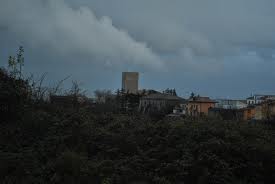
There was a pile of old vines and twigs in the vineyard. We lit a bonfire and the flames licked daylight into the night sky. Next morning there was a gray and black patch of coldashes, perfectly round. It looked hard, like crushed marbles, so I stepped on it. My boot sank deep into tiny feathers. A gray boot and a brow none told me I should have known better.
There are no wild animals. All the dogs look related. The cats are black, a blur of night by day. In spots the road iswashed out or caved in. The train runs no more. A bus passes, but only the wily know where the stop is. There was good spring water until the neighbors encroached and grabbed. The steps to the fields have been broken for years. City hall gets bigger and uglier. Few venture out after dark. Nighthawks in cars cruise the drag between the castle and the church. Round and round, their ceaseless repetition compelling.
There’s sausage roasting in the fireplace. Delicious. There’s new wine and old. The more I’m told the difference the less I can tell. The wood is in the pig pen in the garage. There’s no pig anymore. Slitting pigs’ throats is illegal. I remember the poor pig rustling in his hovel in the old days and that awful sound it made getting its throat cut. The flowers in spring time are so pretty they’d convince you such things never happen. But flowers are liars too.
There’s a guy standing in the dark next to his house smoking a cigarette. We are climbing the steps on the way home from the bonfire. He asks,“Did you feel it?” “Feel what?” “I saw my lamp shaking and ran outside.” That was like ten minutes before, when I was fixated on the fire. I didn’t feel a tremor, the dancing fire dizzying enough. I remember a twitch in nature, is all.
We got worried phone calls. Two hours away, most of Naples milled around outside, anywhere but under a roof. Nothing much happened, a 3.9, cracks in some walls. Not like in back of the castle where a big bopper hit in 1982. Now rubble and renovation mix there, most of the medieval history bulldozed.
The sunshines in the bedroom window. The winter air is sweet. The fog to the west will burn off by noon. The bread is fresh, the tea hot and strong, the marmalade home-made. Hand-made pasta and home-made tomato sauce for lunch, the new and old wine, an afternoon snooze in the silence, the earth spinning like atop, the ceiling lamp not swaying, the fragile crust of this stark, gritty place zipped up, intact, so it seems. You’ve got to believe, a day at a time. A lot of family is around. It’s not all you can ask for, but this is no time to be greedy. It’s all you need, here where less is more.
Elliot Silberberg is an American writer living in Italy. His short novel, The Flood, is published in an Italian translation as Il Diluvio by Sellerio Editore in Palermo.




